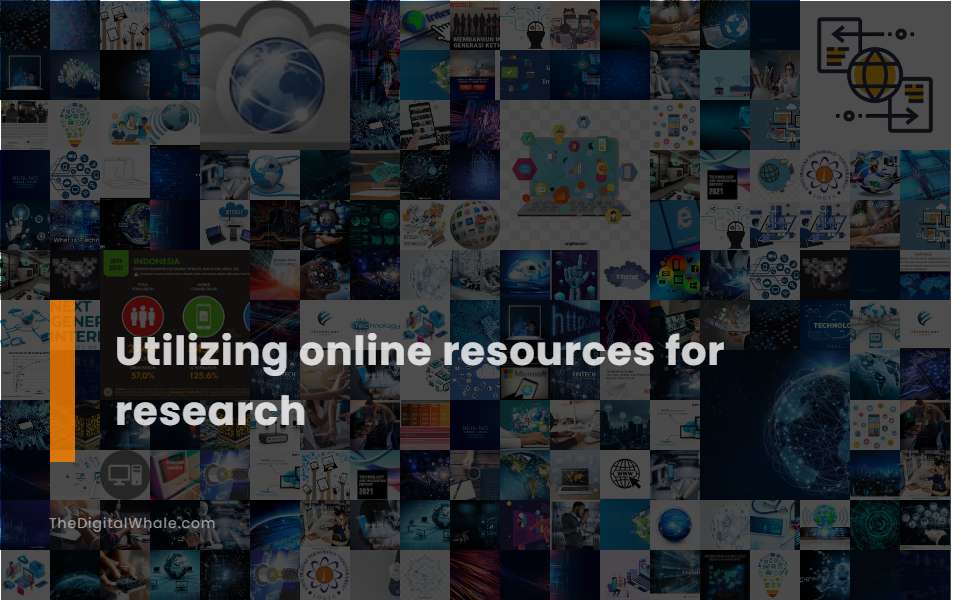Utilizing Online Resources for Research
What are some of the advantages of using online resources for research? What is the best way to evaluate online resources? Let's find out more about Utilizing Online Resources for Research.

Google Scholar: A comprehensive search engine for academic articles, theses, and abstracts.
Google Scholar is a comprehensive search engine that indexes scholarly literature, including journal articles, theses, books, abstracts, and court opinions. It ranks documents based on their full text, publication source, author, and citation frequency to provide the most relevant results for researchers. For more information, visit the Google Scholar page to explore its features and benefits.
JSTOR: A database for journal articles, books, images, and primary sources, particularly strong in humanities and social sciences.
JSTOR is a Digital Library providing full-text access to over 2,600 academic journals, books, and primary sources, with a strong focus on the Humanities and Social Sciences. Offering content from more than 900 publishers and covering over 75 disciplines, the platform is instrumental for researchers and educators. While most access is subscription-based, https://www.jstor.org/ provides some public domain and open access content, broadening its reach to a wider audience and supporting educational equity.
Library of Congress: The largest library in the world, offering digital resources, videos, audio recordings, photographs, and maps.
The Library of Congress offers extensive online resources for research, including digital collections of books, videos, audio recordings, photographs, and maps. Users can access these materials through the Library's search function, download datasets, and utilize tools like the Library of Congress Application Programming Interface (API) for advanced queries, while also exploring exhibitions, finding aids, and other digital content.
PubMed Central: An open-access database for life sciences and biomedical academic sources.
PubMed Central (PMC) is a free digital repository that archives open-access full-text scholarly articles in biomedical and life sciences, providing a comprehensive resource for researchers with enhanced metadata, medical ontology, and unique identifiers. It is distinct from PubMed in that it offers full-text articles rather than just citations and abstracts.
Science.gov: A U.S. government site providing full-text documents and scientific data from federally funded research.
Science.gov is a U.S. government website that provides ready access to federally funded scientific research results, including full-text documents, scientific data, peer-reviewed publications, and other scientific and technical information from over 60 databases and 2200 selected websites across 14 federal agencies. To explore this wealth of information, visit the Science.gov website and discover a vast array of resources made available by multiple federal agencies committed to advancing scientific knowledge.
Related:
What are some tips for giving a great presentation? How to make an amazing slideshow? Let's find out more about Presentation Tips for Using Slideshows Effectively.
Digital Commons Network: A repository of peer-reviewed articles, dissertations, book chapters, and conference proceedings.
The Digital Commons Network is a comprehensive online repository that provides free access to full-text scholarly articles, peer-reviewed journal articles, book chapters, dissertations, working papers, and conference proceedings from hundreds of universities and colleges worldwide. Curated by university librarians and their supporting institutions, this platform ensures a vast range of academic resources are readily available to researchers and the public. Explore the wealth of knowledge by visiting the Digital Commons Network, a pivotal tool in the dissemination of scholarly work.
ResearchGate: A platform for open-access academic sources and networking with researchers.
ResearchGate is a social networking site for scientists and researchers to share papers, ask and answer questions, and find collaborators. It allows users to upload various research outputs, follow other researchers, engage in discussions, and utilize features like a research-focused job board and private chat rooms for sharing data and discussing confidential topics. To explore more about this platform and its benefits for the research community, visit the ResearchGate website.
WorldCat: A database connecting to over 10,000 libraries, allowing searches for books, articles, and other library resources.
WorldCat is a worldwide library catalog that connects to over 10,000 libraries, allowing users to search for books, articles, and other library resources. It contains millions of records, including bibliographic entries and journal articles, and provides localized and personalized content, helping users find the nearest copy of a resource and access it through various means such as interlibrary loans or direct checkout. To learn more about this extensive library network, visit the WorldCat.org Database page, where you can discover the vast possibilities for accessing global resources from the comfort of your local institution.
BASE (Bielefeld Academic Search Engine): An academic search engine hosting over 136 million articles, including open-access research.
BASE, known for its comprehensive academic search capabilities, is managed by Bielefeld University Library and stands as a significant resource for academic research. This powerful search engine indexes over 150 million documents from more than 7,000 sources. Among its vast repository, users can find full-text journals, references, abstracts, theses, reports, and conference proceedings. Impressively, about 60% of these indexed documents are available for free as Open Access, making it a highly accessible and valuable tool for scholars and researchers. To explore this extensive resource, visit the BASE Bielefeld Academic Search Engine page.
CORE (COnnecting REpositories): A search engine dedicated to open-access research papers with links to full-text PDFs or web pages.
CORE (Connecting Repositories) is an academic search engine dedicated to open-access research papers, providing links to full-text PDFs or web pages. It aggregates content from various repositories and journals, offering tools for content discovery and services such as a search engine, recommender system, and access to raw data through APIs and datasets. By visiting their website, users can explore the extensive resources CORE provides to facilitate research and academic exploration.
Related:
What are the advantages and disadvantages of technology? What are some pros and cons of technology in business? Let's find out more about The Benefits and Drawbacks of Using Technology In the Workplace.
